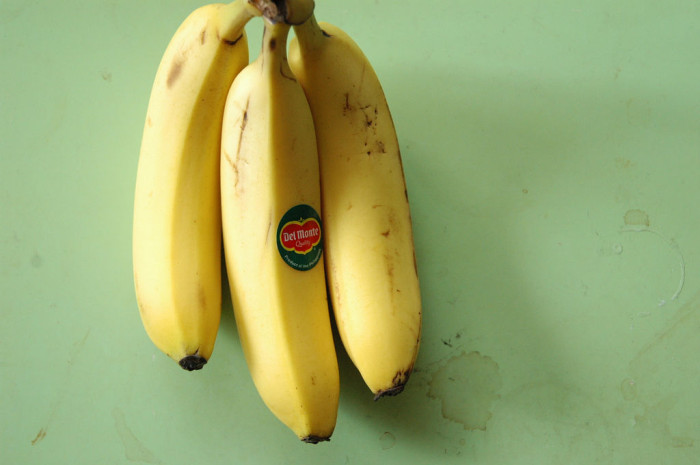I’m stocking up on bananas–and if you like them, you should too. The Cavendish banana (the kind you’ll find in grocery stores) is being threatened by Panama disease, otherwise known as Fusarium wilt. Bananas are the fourth most valuable crop in the world and Panama disease is killing 80-85% of banana and plantain crops per year. Not only is the Cavendish banana affected by the Tropical Race 4 strain of Panama disease, but about 70% of all species of bananas are susceptible–which is bad news for banana suppliers avidly searching for a resistant alternative to the Cavendish.
Panama disease has struck before, wiping out a larger and tastier variety of banana known as the Gros Michel. In 1903, farmers in Panama found yellowed leaves on their banana crops, caused by Race 1, a fungus in the soil that penetrated the roots of the plant, effectively strangling the plant, preventing it from receiving water or nutrients from the soil. In less than fifty years, the Gros Michel was all but extinct, and the disease had caused $2.3 billion dollars in damage (or $18.2 billion dollars today). A replacement for the Gros Michel was found in the Cavendish banana, which was resistant to Race 1. Panama disease has since spread like wildfire and is now found in nearly all banana producing regions.
What makes Panama disease so dangerous to the livelihood of America’s favorite fruit is the fact that Fusarium oxysporum schlect f. sp. cubense, the fungus that causes the disease, cannot be killed, and can lie dormant in soil for decades. A small bit of soil from an unwashed tool or shoe spreads the disease, and once it hits, there is no stopping it. Modern bananas are “mono-crops,” cloned from the cutting of another tree, which means the fruit cannot adapt to changing conditions or pathogens. After Panama disease has struck a banana plantation, bananas can never be grown there again.
Although 70% of exported bananas come from Latin America (not yet hit by Tropical Strain 4), the majority of bananas grown there are not exported, but consumed in the countries they are grown–and countries with high populations of undernourished people grow larger quantities of bananas. Close to nine tenths of all bananas grown are eaten in poor countries–possibly saving millions of lives from starvation. Over 400 million people eat 15-27% of their calories from bananas, and when banana crops die, the people relying on this wonderful fruit for nourishment and income will suffer greatly, since there has been no headway in finding either alternative banana for mass production or a means of stopping Tropical Race 4. Scientists are working on genetically modifying the Cavendish, and organic bananas are not a cheap or viable replacement due to the temperature and altitude they need to thrive, which is not found in many places.
Scientists claim it is only a matter of time until Tropical Race 4 hits (and there is a possibility it has already hit) Latin America, saying “it’s not if, but when.” It could happen tomorrow, 10 years from now, 30 years down the road, but it will happen. And we’ll be singing “Yes, we have no bananas” with tears in our eyes, holes in our stomachs, and an emptiness in our smoothies only bananas can remedy.
What do you think guys? Can you imagine living without bananas – or are you not worried at all? Do you have a banana substitute for recipes or snack? Discuss!
Some of our favorite banana recipes: Happy Strawberry Banana Raw Vegan Bars
Raw Vegan Banana Chocolate Crepes
Also by Jessica: Healthy Dinner: Low Fat Vegan Tamales
- Want to contribute to Peaceful Dumpling? Say hello!
__
Photo: keepon i via Flickr





